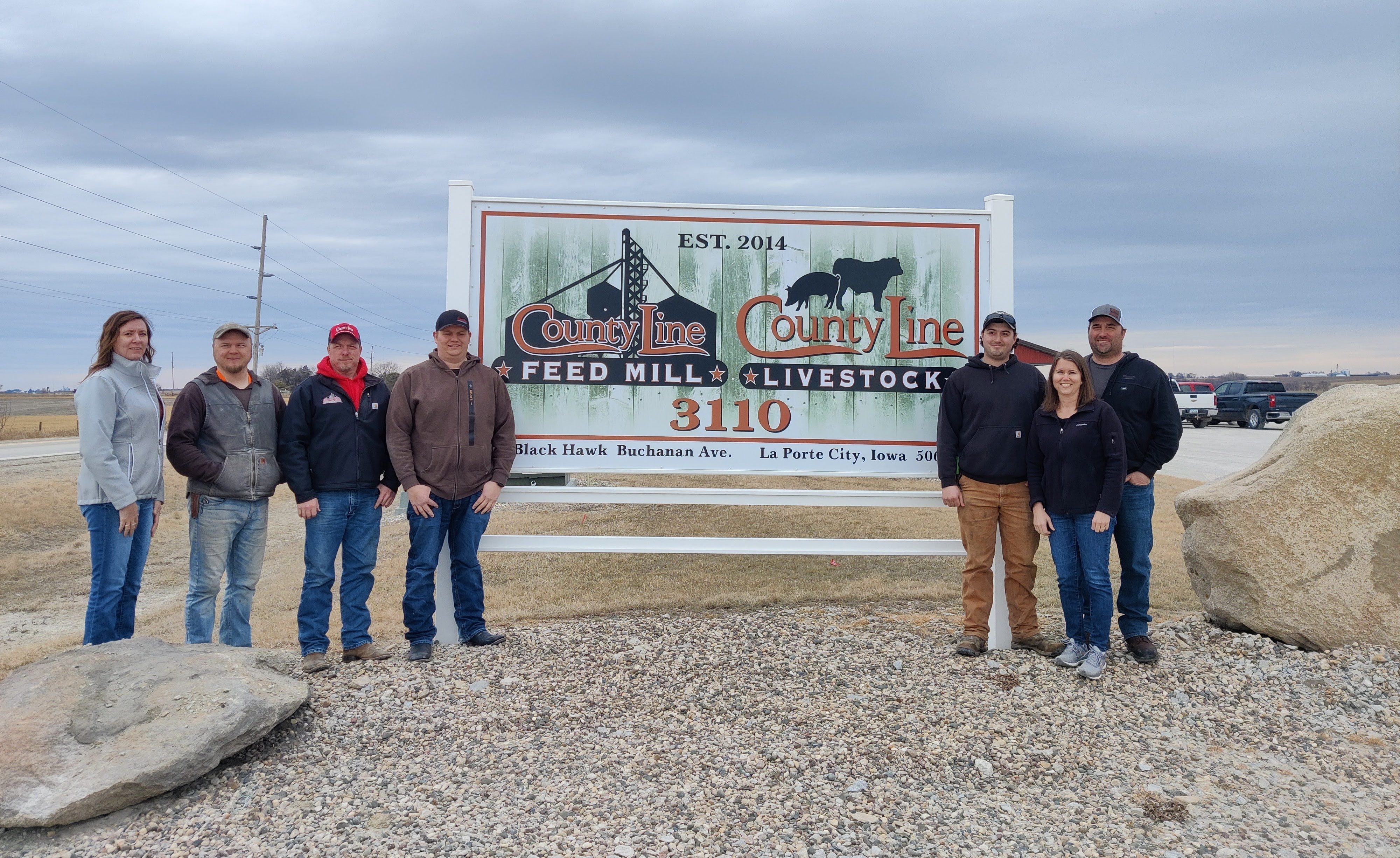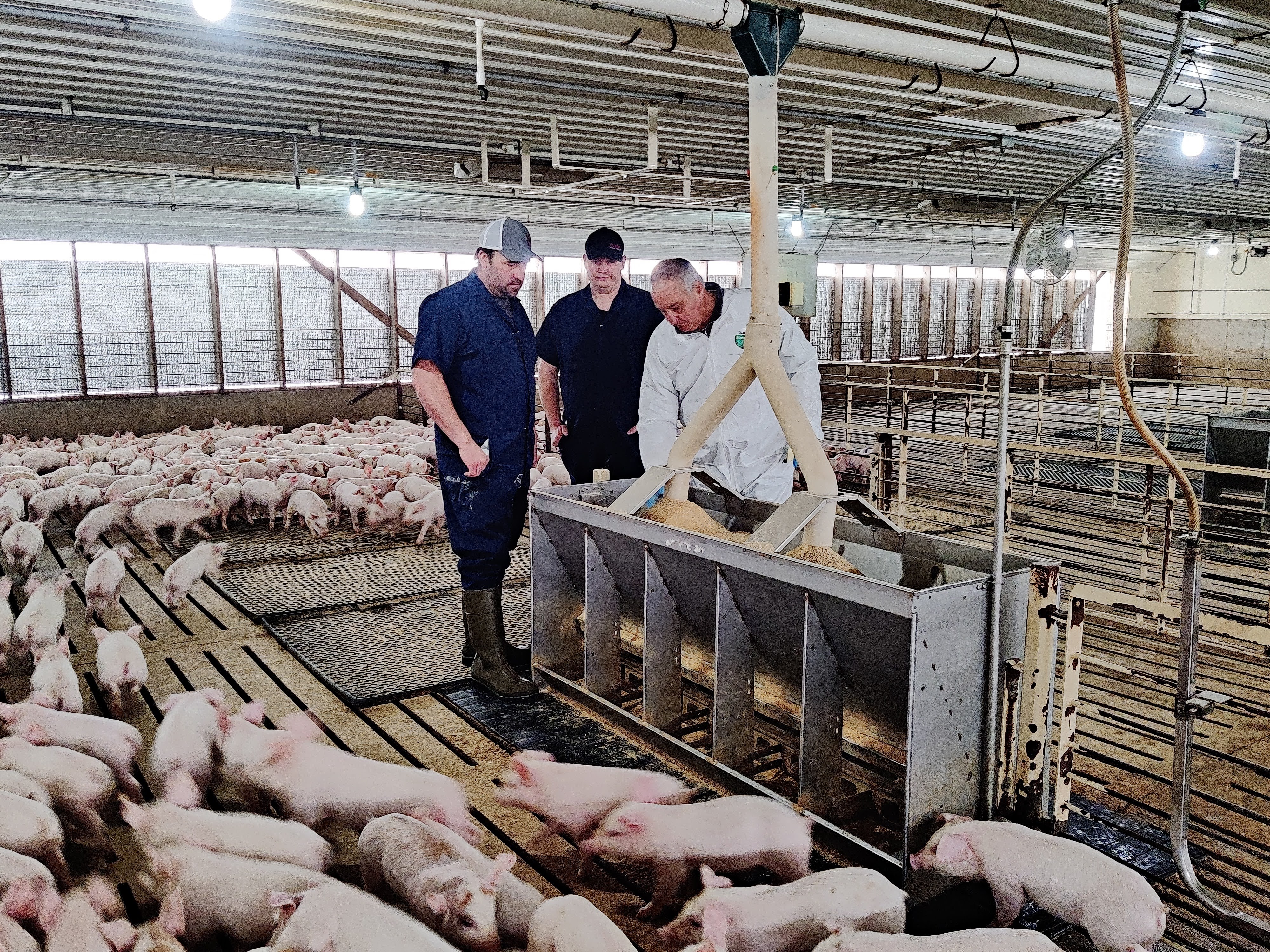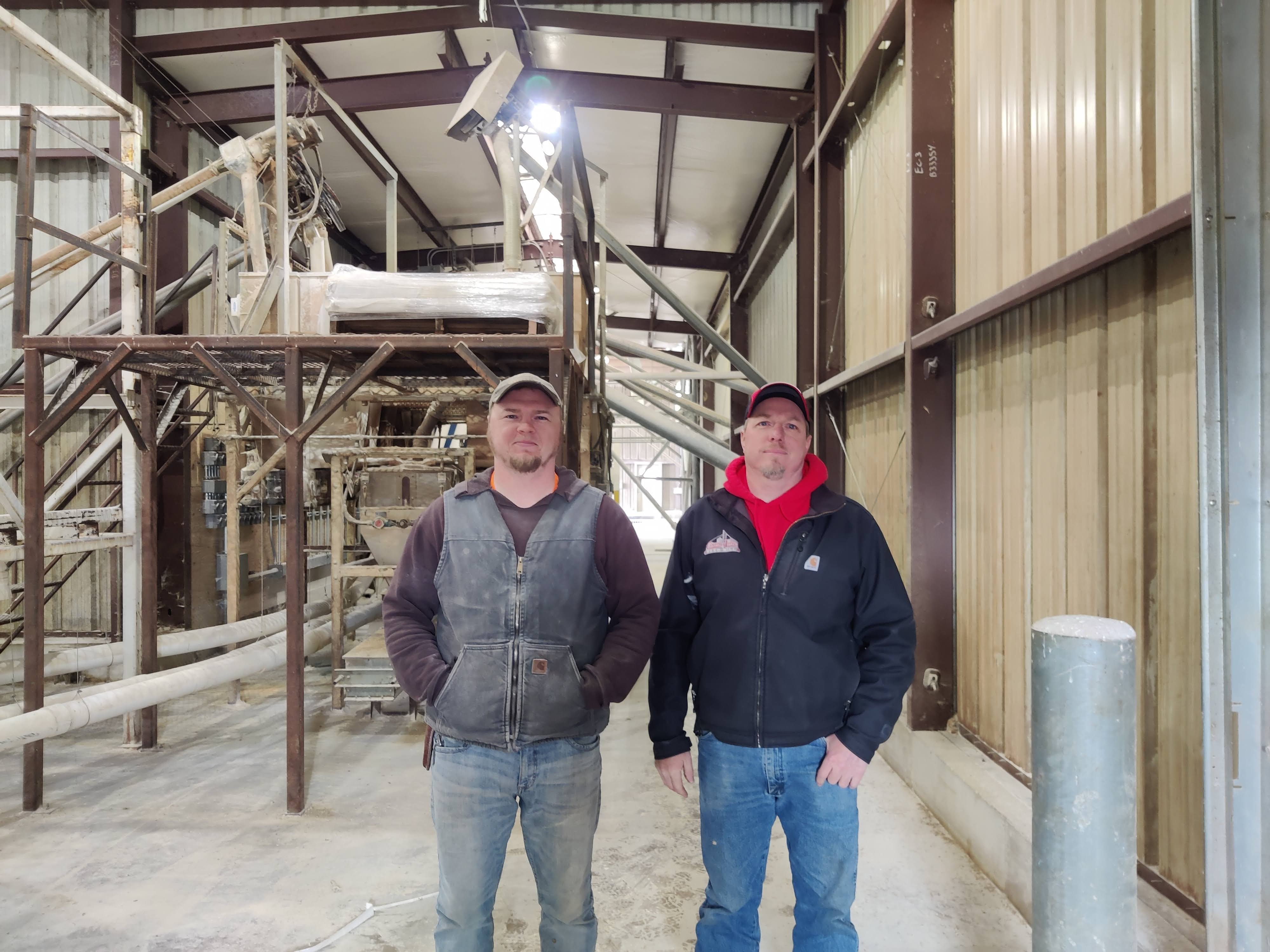 Nestled on the outskirts of Independence, Iowa, are nationally recognized livestock and feed mill operations known as County Line Livestock and County Line Feed Mill. Established in 2002, County Line Livestock started as a feeder pig operation and has strategically developed into how it stands today. County Line Feed Mill is a more recent addition, created to expand the operation and help the farm grow as family involvement grows.
Nestled on the outskirts of Independence, Iowa, are nationally recognized livestock and feed mill operations known as County Line Livestock and County Line Feed Mill. Established in 2002, County Line Livestock started as a feeder pig operation and has strategically developed into how it stands today. County Line Feed Mill is a more recent addition, created to expand the operation and help the farm grow as family involvement grows.
The Thoma families have been proud American farmers for 7 generations. At the forefront of the operation today are brothers, Joe and Matt, and their wives, Jennifer and Michelle. Each play a unique and vital role in feed mill and livestock logistics. In the next working generation are their sons, Blake (Joe and Jennifer) and Jake (Matt and Michelle), as well as their cousin, Dan, and his wife, Ali, who are also heavily involved in daily operations.
“My goal is to maximize our facilities and see that the farm can be passed down to the next generation,” said Joe. “I want to include any family member that wants to be involved in the operation. Having my son farm next to me is like a dream come true. As it was with my dad and my grandfather, passing on the farm is of the utmost importance. Doing that is top priority here.”
Their journey with PIPESTONE began when searching for a veterinarian. Currently, the Thomas utilize multiple service offerings from PIPESTONE to help them collect and track data, source their wean pigs and find labor for their barns. Dr. Bryan Myers, veterinarian with Pipestone Veterinary Services, has been working with County Line for the last 14 of those years.
“My role with County Line Livestock is to help them on the production and health side of raising pigs, all the way from the sow farms, through their wean to market operation,” said Dr. Myers.
Dr. Myers witnessed growth and success firsthand while offering health advice to ensure every pig flow is profitable and valuable.
 “We were looking for a veterinarian to help us with our continuous PRRS problems in our farrowing unit. We had 300 sows at the time,” Joe explained. “It evolved into turning our farrowing unit into a nursery and investing into Pipestone Management sow farms. We have expanded rapidly from there.”
“We were looking for a veterinarian to help us with our continuous PRRS problems in our farrowing unit. We had 300 sows at the time,” Joe explained. “It evolved into turning our farrowing unit into a nursery and investing into Pipestone Management sow farms. We have expanded rapidly from there.”
County Line Livestock markets 60,000 pigs a year, sourcing all their wean pigs through PIPESTONE managed sow farms. County Line Feed Mill averages about 750 tons of feed per week. Through data driven decisions, the Thomas make practical decisions in order to see that their operation is running efficiently. Today, County Line utilizes all 5 service offerings of PIPESTONE to help achieve that efficiency: Pipestone Veterinary Services, Pipestone Management, Pipestone Nutrition, Pipestone Business and Big Stone Marketing.
“Data is important on our farm because if we don’t know what the problem is, we can’t fix it. We have to be able to look at the data and see what’s wrong,” said Blake, who works in the barns daily and helps track their data. “On a daily or weekly basis, we use data to track mortality in the barn and on the truck, how much we are spending on medications and feed, water consumption and temperature in the barn. All the little things that add up make a difference on whether it’s a good group of pigs.”
Through Pipestone Business, the Thomas are able to keep neat and accurate records and supply their barns with talented labor through FarmStats and FarmTeam. PART (Pipestone Antibiotic Resistance Tracker) allows County Line Livestock to track their medication use throughout all of their sites in one place. Big Stone Marketing gets their finisher pigs sold at the right price, and Pipestone Nutrition has played a key role in feed mill logistics.
“To me, data analysis is one of the most important things to be doing,” said Joe. “On our row crop land, we farm by the inch and make every kernel of seed count. Bringing that to the livestock side, every pig counts on an individual basis. The data helps us figure out how to farm better, all the time. The only way we know how we’re doing is if we have good data.”
The Thomas use data to adjust just about every aspect of pig farming accordingly. Using data allows them to verify they are making the best choice for their pigs everyday to keep them happy, healthy and comfortable.
“It’s really important that operations keep good data so they can make good decisions,” Dr. Myers explained. “The interesting thing about working with pigs is small changes can result in big differences. If you change feed conversion by 1/10th, it makes a huge impact to an operation that markets 60,000 pigs a year. Lowering mortality by half a percent leads to a huge difference in teh farm’s profitability.”
Data has been helpful not only on the livestock side, but also on the feed mill side. Jake Thoma currently serves as County Line Feed Mill’s general manager.
“When we first started the feed mill, we weren’t feeding any sows,” Jake said. “Now, we’ve grown our own head counts as well as taken on some neighbors as customers. Our mill has grown a lot more than I thought we ever would.” 
Jake uses data programs on the mill’s computer to track inventory and make individual feed orders. The different programs talk to each other and send the ingredients to the machine computer where they are dropped down and added to the batch.
“PIPESTONE has helped us develop a good way to raise pigs,” Joe said. “As we’ve grown and taken on more sites and pigs, FarmTeam has helped from a labor perspective. FarmTeam members have made it easier for us to manage other aspects of our operation. It has freed up a lot of my time to do a better job marketing pigs and working on the finances of the farm. It’s also allowed my son, Blake, to move into a position of taking over more of what I do in the near future, so I can take over what my dad does when he decides to retire around 105 years old,” Joe joked.
FarmTeam members assist grow-finish farms on day-to-day choring, load-outs and any other labor intensive jobs. The Thomas have made a point to welcome FarmTeam members with open arms and fit them into the family dynamic that exists on the farm.
“When you talk about the family tree and the family dynamic here, the first thing that comes to my mind is sustainability,” Joe said. “That’s a buzz word; everybody wants to talk about sustainability. When I look at sustainability, my definition is being able to keep the farm going an passing it on from generation to generation. I am the 6th generation of the Thoma family to farm. I feel it’s a noble profession to provide food and to do a good job at it.”
Similarly, Blake is proud to be the 7th generation of Thoma farmers. He has returned full-time to the farm after graduating college and working off the farm for a few years.
“My favorite part about pig farming is being able to feed people and see the pigs grow. When we get done with a group of pigs and see we didn’t lose any and had good health throughout, it’s really rewarding,” Blake said.
The Thomas set a great example for pig farmers nation-wide. Their success raising and feeding pigs in proven in the data they collect.
“The Thoma families, I say families because there’s multiple families involved, embody what farmers should be and what they should strive to be. They’re good stewards of the land, of their livestock and they’re good proponents of our pork industry,” Dr. Myers explained with a smile. “I think it’s a great privilege to work with County Line Livestock, County Line Feed Mill and the Thoma families in their multi-generation farm because I think it’s completely fulfilling the mission of PIPESTONE in that we are helping family farmers maintain and be the farms of tomorrow.”
Article and video by: Kyra Flom Website and Digital Specialist, PIPESTONE
